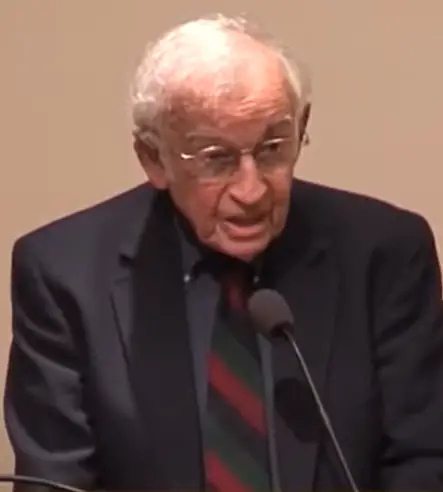Sidney Mintz
(1922 - 2015)

Sidney Wilfred Mintz, widely regarded as the father of food anthropology, was born on November 16, 1922, in Dover, New Jersey, to Jewish immigrants from Eastern Europe. His father, Solomon Mintz, was a dye maker and later a clothing salesman, while his mother, Fanny Tulchin, worked as a seamstress and was active in the Industrial Workers of the World (the “Wobblies”). Mintz’s Jewish upbringing and working-class background profoundly shaped his lifelong sensitivity to labor, oppression, and social justice — themes defined his scholarship.
Mintz earned his bachelor’s degree in psychology from Brooklyn College in 1943 and served in the U.S. Air Force during World War II. He completed his Ph.D. in anthropology at Columbia University, where he studied under Julian Steward and Ruth Benedict.
His early fieldwork in Puerto Rico in the late 1940s and 1950s examined plantation life and the transformation of Caribbean societies under colonial rule. This culminated in Worker in the Cane (1960), a groundbreaking life history of a Puerto Rican sugarcane laborer, and Caribbean Transformations (1974).
Mintz taught at Yale University, where he helped establish one of the first African American Studies programs in the early 1970s. He then joined Johns Hopkins University to found its anthropology department in 1975 and became professor emeritus there in 1997.
His most influential work, Sweetness and Power: The Place of Sugar in Modern History (1985), examined how the global demand for sugar intertwined slavery, capitalism, and empire. Mintz demonstrated how the daily consumption of sugar in Europe reflected and reinforced global inequalities — transforming a colonial luxury into a mass necessity. He later expanded his research to other food commodities, such as soy, and explored the cultural meanings of taste in Tasting Food, Tasting Freedom (1996).
Mintz’s scholarship combined Marxian analysis with ethnographic depth, emphasizing that culture could not be separated from historical and economic forces. His work influenced historians, sociologists, and activists alike, inspiring generations of anthropologists to view everyday consumption as a site of power and identity.
While Mintz rarely foregrounded his Jewish identity in his writings, his intellectual roots were deeply intertwined with Jewish traditions of inquiry, ethical responsibility, and social justice. Born to Eastern European Jews active in labor organizing, Mintz carried forward a moral concern for the marginalized — from Caribbean sugar workers to the global poor. His historical sensibility and empathy for “the oppressed of history” reflected an ethos consistent with Jewish humanist values.
Sidney Mintz died on December 27, 2015, in Plainsboro, New Jersey, at 93. Tributes hailed him as a pioneering thinker who revolutionized how anthropology connects culture, economics, and history.
Mintz’s legacy endures through the many scholars he mentored and the intellectual field he created, which sees food not as mere sustenance but as a window into human civilization.
Sources: “Sidney W. Mintz (1922–2015), In Memoriam,” Living Anthropologically.
“Sidney Mintz, Father of ‘Food Anthropology,’ Dies at 93,” Times of Israel, (December 31, 2015).
Sam Roberts, “Sidney Mintz, Father of Food Anthropology, Dies at 93,” New York Times, (December 30, 2015).
Paul Levy, “Sidney Mintz: The ‘Father of Food Anthropology’ Who Wrote a Landmark Work on Sugar,” Independent, (March 22, 2016).
Virginia R. Dominguez, “Anthropological Work and Legacy of Sidney W. Mintz,” Bérose Encyclopedia of the Histories of Anthropology, (2019).
Photo: Screenshot - SOAS University of London.


